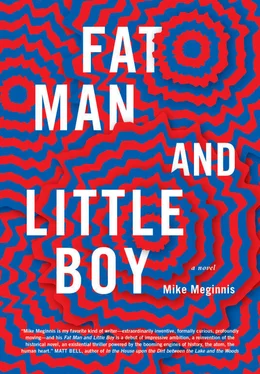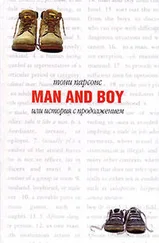Instead he asks her, “Should I say goodbye to your husband?”
She forces a smile, shakes her head no. She has been gentle since the medium had him up on the stage. “Albert is very busy looking for money,” she says, “under every rock, behind every door, in every seat cushion. Or so he tells me. Now that he’s going to be a father he says it’s time he really provides .”
“A father?” says Fat Man, with all the cultivated mincing friendliness he despises in his fellow fat men. “Congratulations, Francine! May I?” He indicates her ballooning tummy. She agrees. As he lowers his head, he recognizes his mistake. As he presses his ear to the swell, regret bubbles inside. At first he hears nothing. Then the thrashing begins. Francine moans, pained.
“They like you,” she says. “They like you a lot, I guess.”
It sounds as if they will tear their way out if he stays. Fat Man reminds himself why he is leaving with barren Rosie Cummings. “Would you like some water?” he says. Francine raises two curled fingers and shakes them no while she swallows back some burning thing, covering her mouth with her other hand. He goes to the sink. “Twins,” he says. “I hope they get along.”
“Mmm,” agrees Francine, nodding.
“A brother you can be really close with,” says Fat Man. “That’s special. That’ll save your life.” He fills his glass. The water smells a little strange out here, he’s noticed. Water’s different everywhere and no one ever wants to talk about it.
“Do you have any brothers?” says Francine.
“I guess I’ve got one.” He says this in a way that means he’d rather not discuss it.
Little Boy comes down from the bathroom. He walks into the room slowly, hands tucked into his pockets like secrets.
“I think Matthew has something he’d like to say to you,” says Fat Man. Little Boy nods.
“Well go on, Matthew,” says Francine, “I’m listening.” She rests her hands on her babies. Rubs them in slow, small soothing circles.
He removes folded paper from his right pocket, unfolds it, and grips it with both hands to pull the creases smooth. “Mademoiselle Francine. Merci d’avoir pris, soins de nous.” He refolds the note and pushes it into her hand so she can think of them fondly later.
“How darling,” says Francine. “Thank you for letting me hear your first words.”
“He used to talk all the time,” says Fat Man. “These days it’s a battle.”
Little Boy looks up at them and smiles vacantly as if he is forgetting all his English.
Rosie Cummings has bought them bicycles to match her own. They are solid brown metal like grasshoppers on wheels. They have bells with clear, sharp sounds and wide wheels with white sides. Their seats are long and wide in the back. Fat Man thanks Rosie. Little Boy forgets until his brother cuffs his ear.
They’ll ride south. Rosie says there are men at work on her hotel, and it’s okay if it takes them a little time to arrive—the men will still be working when they get there, tearing down fences and rebuilding the huts-cum-rooms. If they come to a large hill, they will walk their bikes to the summit and picnic when they get there, or they will ride around it in a slow circle. When they find a paved road kind to bicycles, they will ride on it even if it takes them out of their way.
Fat Man tells Little Boy how lucky they are to be on this trip, to see such a beautiful country, to spend time in the company of such a generous and charming widow. “Woman,” he corrects himself. “Woman.” Little Boy crosses his arms, bites his lip, and climbs atop his bicycle. It immediately falls over, in spite of the kickstand. He lands on the street, elbows scraped, eyes welling. Fat Man waits for Rosie to kneel and comfort the boy the way women do—to dry his tears with her blouse tails, to bandage him with things she’s stowed in her purse. She looks at the child, watches him begin to cry. Fat Man sees that she will go on watching. He kneels over Little Boy. He smoothes his brother’s hair and puts his hat back on. “You’ll be okay,” he says. “Come on. Dust yourself off.”
Little Boy gets up on his feet and brushes grit and gravel from his elbows. He bitterly regards his new conveyance.
“He’s never ridden on a bicycle before,” says Fat Man.
“Never?”
Fat Man almost admits he’s never ridden one either before realizing how strange that would sound.
“His parents were very poor, the same as me,” he explains. “Here, Matthew. Try again.” He props up the bike, holds it by the handlebar and the back end of the seat.
Little Boy hoists himself up cautiously.
“That’s the way,” says Rosie. “You look smart perched up there, Matthew.”
Fat Man lets the other two get out ahead before he mounts his own bike, carefully observing Rosie’s example—even Little Boy’s—for clues. As they pedal out of town he sees two police walking the far side of the street. These are not their police: not Mr. Bruce, not Rousseau. So his escape is clean. He needn’t shiver as they pass.
They ride like this: Little Boy goes first to set the pace because he is the slowest, then Rosie. Fat Man guards their rear. Here he is well-positioned to watch her pedal. The steady rise and fall of her ankles, the same of her hindquarters as wide and flat as the disc of the moon, the flag-like flicker of the loose ends of her copper hair drawn back and tied up tight.
When they come to a hotel the widow lets the staff think them a family so they can share a room. She sleeps on the bed. Little Boy sleeps on the floor until one night Fat Man suggests it might not be indecent for widow and child to share, and she agrees on the condition they lie in opposite directions. Fat Man therefore has the floor to himself, which makes him remember Japan. He swaddles himself in what sheets the bed can spare and rests his head on woolen towels. One night he comes back from using the bathroom, padding softly, and finds himself looking down on them in their bed like a rejected father. There is a little color on her wide, full lips. A little red. A little pink beneath her eyes, perhaps natural, perhaps applied and dithered by hand. Unfurled on her pillow, her hair is limp and slightly curled. There is a calm in her body. Fat Man contrasts his beating heart, his heaving acid tummy. Yet again, he is seized by the urge to thrash himself until his ribs break and his contents spill out on the floor.
He goes to his swaddling, his towel-pillow, and covers up as best he can.
Everywhere they are haunted by the marshal, Pétain, his bust, his white head—his smooth, featureless eyes. One farm has mounted his head on a pike, hanging red rags from his interrupted neck to suggest the severance to come. In a restaurant, a row of Pétains holds hats for customers.
They ride through a small town with a chocolate factory that makes everything smell wonderful when it rains. Fat Man wants to eat the town, the people, their things.
They see Camp Gurs far away, far across a rat-gray field of mud. Dozens of triangular huts, yards and yards of barbed wire fence—some stripped, most still threaded. There are signs of trucks and men at work. Tracks in the mud. No fires though, and no movement among the ramshackle.
FAT MAN WORKS
WITH HIS HANDS
There are about four hundred cabins divided into square clusters of thirty, each cabin’s foundation occupying twenty-five square meters of ground. They are built from thin, cheap cardboard-like wood, which has been covered with variously colored fabrics and pasted with tar to seal out the constant rain. The tar does not work; rot develops, slowly eating the fabrics with heavy molds. The roofs leak. Three out of four cabins are knocked down easily with sledgehammers, leaving only the strongest, safest one hundred structures. Furthermore, they destroy the triangular support beams that lie on either side of the stronger structures, holding up the cabins with bits of scaffolding on the inside. Around these squalid cabins the men lay white and slate-blue bricks, and build them new wooden roofs over the old ones. They cut out windows and inlay the squares with glass so thick it looks like the ocean—glass so thick you can see waves in its surface, and ripples, and the grainy impurities suspended within. A single wooden beam is fitted to each wall inside, waist-high, and slid into grooves within the bricks, so that nothing collapses inside. They set down wood flooring, and thick green carpets over that. Each hut is given a stove to keep it warm. Otherwise the interiors remain untouched wherever possible. Rosie calls it restoration. Outside the new cabins are charming, oddly featureless freestanding brick buildings the color of mountains. Inside they are historical artifacts: educations in the standard of living enjoyed by those in concentration camps. She says, “It is important that in building new history for ourselves we do not forget the old. We could do that anywhere. Here, we can also remember, even as we rebuild.”
Читать дальше












